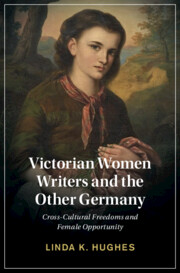Book contents
- Victorian Women Writers and the Other Germany
- Cambridge Studies in Nineteenth-Century Literature and Culture
- Victorian Women Writers and the Other Germany
- Copyright page
- Dedication
- Epigraph
- Contents
- Figures
- Acknowledgements
- Preface/Vorwort
- Introduction
- Chapter 1 Entrée to the ‘Other’ Germany
- Chapter 2 Germany through a Female Lens
- Chapter 3 Networked Families in Germany
- Chapter 4 An Unbeliever in Germany
- Chapter 5 The Anglo–German Fiction of George Eliot and Jessie Fothergill
- Chapter 6 New Woman Travellers and Translators
- Chapter 7 An Anglo–German Expatriate–Citizen
- Chapter 8 Queer Borders
- Nachwort/Afterword
- Notes
- Bibliography
- Index
- Cambridge Studies in Nineteenth-Century Literature and Culture
Nachwort/Afterword
Published online by Cambridge University Press: 02 June 2022
- Victorian Women Writers and the Other Germany
- Cambridge Studies in Nineteenth-Century Literature and Culture
- Victorian Women Writers and the Other Germany
- Copyright page
- Dedication
- Epigraph
- Contents
- Figures
- Acknowledgements
- Preface/Vorwort
- Introduction
- Chapter 1 Entrée to the ‘Other’ Germany
- Chapter 2 Germany through a Female Lens
- Chapter 3 Networked Families in Germany
- Chapter 4 An Unbeliever in Germany
- Chapter 5 The Anglo–German Fiction of George Eliot and Jessie Fothergill
- Chapter 6 New Woman Travellers and Translators
- Chapter 7 An Anglo–German Expatriate–Citizen
- Chapter 8 Queer Borders
- Nachwort/Afterword
- Notes
- Bibliography
- Index
- Cambridge Studies in Nineteenth-Century Literature and Culture
Summary
This study closes after 1908 with good reason. ‘The other Germany’ beloved by Vernon Lee was destroyed by World War I. In preceding decades Germany was a brave new woman’s world for Jameson in the 1830s, a strategic career and economic opportunity for the Howitts, a welcoming place to recuperate after her daughter’s broken engagement for Gaskell, a refuge and source of increasing cosmopolitan sophistication for Eliot, a world of music and unconventional freedoms for Fothergill, an aesthetic archive for Michael Field, the home of Heine and his language for Levy, a catalyst for the expatriate identity and writing career for von Arnim, and a nurturing feminine zone for Lee and her imagination. After World War I and into the twentieth century, Germany became for most British writers, to invert Lee’s words, precisely the country that sought to colonise and would eventually ‘frighten the rest of the world in various ways’. Of course Germany’s language and literary legacy remained, but the culture quickly became associated with military aggression and hostility rather than with a welcoming land for Britons. And with the dreadful slaughter of trench warfare and the Treaty of Versailles (1919), which demanded such stringent war reparations that it fuelled Germany’s march to World War II, the very borders of Europe changed.
- Type
- Chapter
- Information
- Victorian Women Writers and the Other GermanyCross-Cultural Freedoms and Female Opportunity, pp. 209 - 211Publisher: Cambridge University PressPrint publication year: 2022

